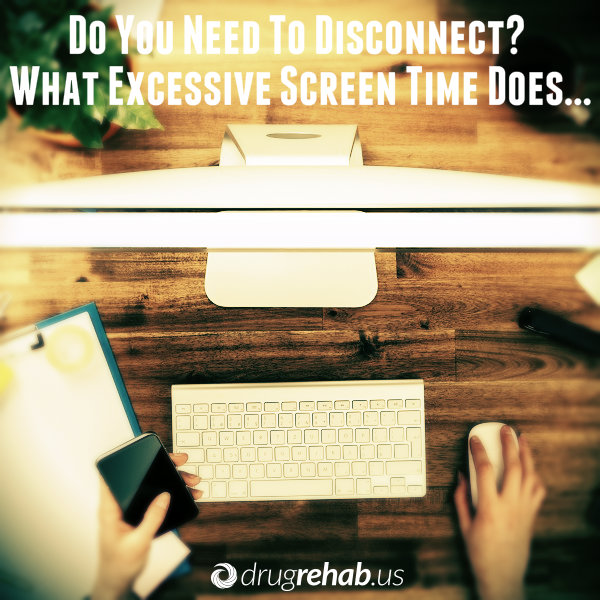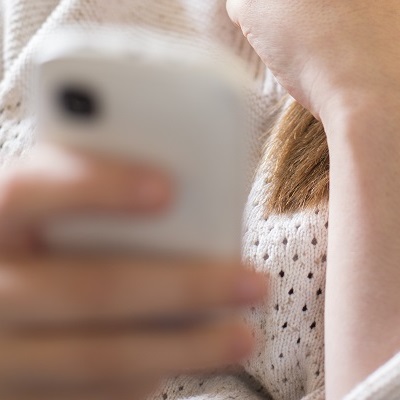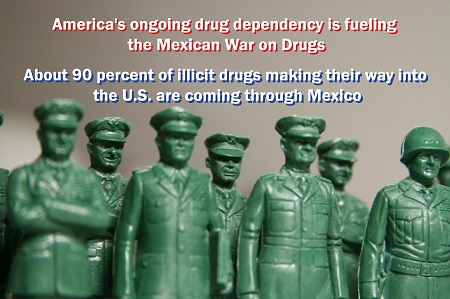A new study has investigated the widespread use of cell phones and smartphones in the U.S., leading many experts to suggest taking some time out of each day to disconnect in order to protect against the potentially addictive effects of technology use. The findings may be a little basic—focusing about as much on connection problems and telemarketing as potential markers of addiction—but they still serves as a wakeup call to the impact cell phones may be having on both American youth and adults.
So does the risk of Internet and technology addiction mean you might need to disconnect? The evidence seems to say so, but precisely defining these addictions is harder than it might seem.
Cell Phone Use And Time Staring At Screens
 The most basic finding from the research is that 90 percent of American adults have a cell phone, and 58 percent have a smartphone. In addition to many more mundane findings, the results strongly hint at a problem with excessive smartphone use.
The most basic finding from the research is that 90 percent of American adults have a cell phone, and 58 percent have a smartphone. In addition to many more mundane findings, the results strongly hint at a problem with excessive smartphone use.
In particular, the survey revealed that 44 percent of cell phone owners have slept with their phones next to their beds so that they wouldn’t miss calls, texts or other updates through the night. Over two-thirds of cell phone owners check for messages or updates even if their phones don’t ring, sound a tone or vibrate, and about three in 10 say they couldn’t imagine living without their phones.
Americans spend an average of seven hours and 24 minutes staring at screens each day, and for 8- to 10-year-old children, the average is eight hours. Teens spend the most time looking at screens on average, reaching a huge 11 hours per day.
An Overstimulated State
The increasing use of cell phones has many direct impacts, relating to both being connected and spending so much time looking at screens. Constant checking of your cell phone can make it harder to fall asleep, keeping your brain in an anxious, overstimulated state. This same effect occurs when messages you send aren’t responded to quickly—you find yourself checking your phone and possibly worrying that your message didn’t come across as intended. Research suggests that staring at screens makes people less creative and less productive.
There are also more obvious consequences of excessive cell phone use, in particular spending less time socializing with people in real life or engaging in hobbies. Even when people do socialize, it’s becoming increasingly common for a group of people to sit staring at their screens while ignoring the people around them.
Technology And Internet Use As Addictions
Internet addiction has yet to be officially acknowledged as a condition by the Diagnostic and Statistical Manual of Mental Disorders (the DSM), but most experts—who are seeing increasing numbers of people seeking help for technology and Internet addictions—accept its existence. It might seem counterintuitive that an addiction can persist without a substance, but addiction really comes down to the effect something has on the brain, and other behavioral addictions such as gambling addiction have gained widespread acceptance because of these addiction-like effects on the brain.
Looking at the definition of addiction in a broad sense also reveals the striking similarities with excessive Internet and technology use. Addictions of any kind are characterized by an inability to control how often you engage in an activity, feeling urges or cravings to engage in the activity and continuing with it despite negative consequences.
Internet and technology addicts run into problems with work and school when they’re unable to stop surfing the Internet or using their devices. They may also jeopardize relationships and suffer withdrawal-like symptoms when they’re disconnected.
The similarities are hard to deny, but there are still some problems with classifying technology or Internet use as an addiction. First, the Internet (and technology used to access it) often serves as a method to access other addictive media, like pornography, online casinos or video games, so it’s hard to pin down whether somebody is addicted to the Internet or something else that’s accessed online. Additionally, it’s difficult to define just how much use is too much.
These problems are more technical than anything, however. Real-world examples of people ruining their lives over excessive Internet or technology use and being unable to stop speak volumes about the problem. Clearly, something unusual is going on.
Disconnecting To Protect Against The Risk
Internet and technology addiction are almost certainly real conditions, and we need to take the risks seriously because the vast majority of Americans now use Internet-equipped devices. Although full-blown technology or Internet addiction won’t affect most of us (like most addictions won’t), taking steps to guard against overuse is a prudent move. Many experts recommend simply disconnecting for an hour each day, preferably before bed, but doing so any time throughout the day is beneficial. There are apps designed to help you limit the time you spend on your smartphone.
There are many similar approaches available that are suitable for less severe cases, and many more professional counseling or rehab programs if you’re struggling with a more serious addiction. As we continue to spend more and more time online, thinking about the extent of our use and its consequences is becoming increasingly important.
Read Our Other Intriguing Posts On Internet Addiction
You may be addicted to your smartphone, and if you are, your health is suffering. No, your phone is not a drug, but if you get anxious and panicky when you misplace it for two minutes or you check for new texts or Facebook updates every five seconds, you’re acting like an addict.
Sure, smartphones have made our lives easier and more convenient. They have even eliminated boredom from our daily existence, but at what cost?
Read on and you may decide to scale back your attachment to your favorite device.
Your Pocket Is Vibrating, Or Is It?
 Phantom vibrations — when you think your phone just notified you of a message so you look at it and find nothing — are common among obsessed smartphone users. This phenomenon seems funny, but it’s a psychological disruption.
Phantom vibrations — when you think your phone just notified you of a message so you look at it and find nothing — are common among obsessed smartphone users. This phenomenon seems funny, but it’s a psychological disruption.
The next time you experience a phantom vibration, check your emotions. Did it make you feel anxious? Were you excited when you thought you had a new message or update, and were you disappointed to find you didn’t?
Did you then check your phone compulsively, sure that a notification was about to present itself? Anything that makes you feel this way is not healthy.
Your Smartphone Is Disrupting Your Sleep
Do you keep your phone on your bedside table? Do you scroll through it just before closing your eyes to sleep at night? Do you pick it up as soon as you wake up in the morning? While for safety and emergency purposes it seems justifiable to keep your phone next to your bed, your habits in using it are probably causing you to lose sleep. Studies have found that the type of light produced by your smartphone disrupts the production of hormones you need for good sleep. This means that it’s more difficult to fall asleep after screen time.
Another way your nighttime phone habit is interfering with your sleep is more psychological. You aren’t fully disconnecting from work and other preoccupations before you try to sleep at night. If you can’t detach, you will have trouble falling asleep, and your sleep may be disrupted because you are still thinking about work and other responsibilities. Stay away from the screen and turn off notifications two hours before bedtime to drastically improve your sleep and your energy levels during the day.
Your Smartphone Is Damaging Your Eyes
This is a scary one because it could have a lasting impact on so many people. The time you spend watching your phone’s screen is increasing your risk of eye damage. The bluish light from your smartphone that disrupts your sleep is also bad for your eyes. Exposure to it puts you at risk for macular degeneration, which is the most common cause of blindness. It is extended and frequent exposure to this light that causes damage, so if you cut back your time with the phone, you can cut out the risk.
Do You Have Nomophobia?
This modern problem is the fear of losing your phone: no-mobile-phone-phobia. According to a survey conducted by a British tech company, nomophobia is on the rise. Out of 1,000 people surveyed, two-thirds were seriously afraid of losing their phones. Nearly half keep two phones because of this fear, and young people are the most nomophobic. If you feel anxious and break into a cold sweat just thinking about misplacing your phone, you probably have nomophobia.
Tips For Those Struggling With Smartphone Obsession
Smartphone addiction is a serious problem for more and more people. To make sure that you aren’t suffering because of your phone use, cut back on your screen time. Stop using your phone before bed and refrain from touching it in the morning, at least until you are up and making coffee. Take breaks from it throughout the day and even consider taking one whole day each week away from your phone. It will be hard at first, but you won’t regret cutting back.
Learn More About Other Behavioral Addictions
Reporting the news in Mexico can be a deadly occupation, especially for those covering the drug war. But where militant thugs have been successful in stifling the media, they are virtually powerless against those who have taken to social media to “report” the war.
It’s not only Mexican residents caught in the crossfire taking to Twitter, YouTube and Facebook, those across the border in the U.S. are also using social media as a tool. Residents are using social media to protect themselves from the drug cartels that stop at nothing to push their product and protect their turf.
 The violence began in earnest when the Mexican president declared war on drugs, but crept up another few notches when two major partnering cartels split and declared war on each other. Since the declarations of war, it is estimated that as many as 100,000 people have been killed and another 30,000 have seemingly vanished into thin air. Many residents try to escape the most violent areas, which has put more than 200,000 in a displaced status.
The violence began in earnest when the Mexican president declared war on drugs, but crept up another few notches when two major partnering cartels split and declared war on each other. Since the declarations of war, it is estimated that as many as 100,000 people have been killed and another 30,000 have seemingly vanished into thin air. Many residents try to escape the most violent areas, which has put more than 200,000 in a displaced status.
Some of the only news sources available now are through Twitter and Facebook. While news footage once came from the major broadcast companies in Mexico, camera phones with crudely edited footage of the war between the government and the cartels is being placed on YouTube instead. Media outlets in the U.S. are also depending on these amateur videos as their go-to source for footage.
America’s ongoing drug dependency is fueling this war. About 90 percent of illicit drugs making their way into the U.S. are coming through Mexico. The biggest cash crop, so to speak, continues to be cocaine.
According to the National Institute on Drug Abuse, nearly 5 million Americans said they had at one point or other abused cocaine. While those numbers pale in comparison to the drug’s peak in 1982 (10.5 million were believed to be using the drug in that year), it’s still enough to fuel a drug war that is taking lives.
Read more: United Nations Leading International War on Drugs


